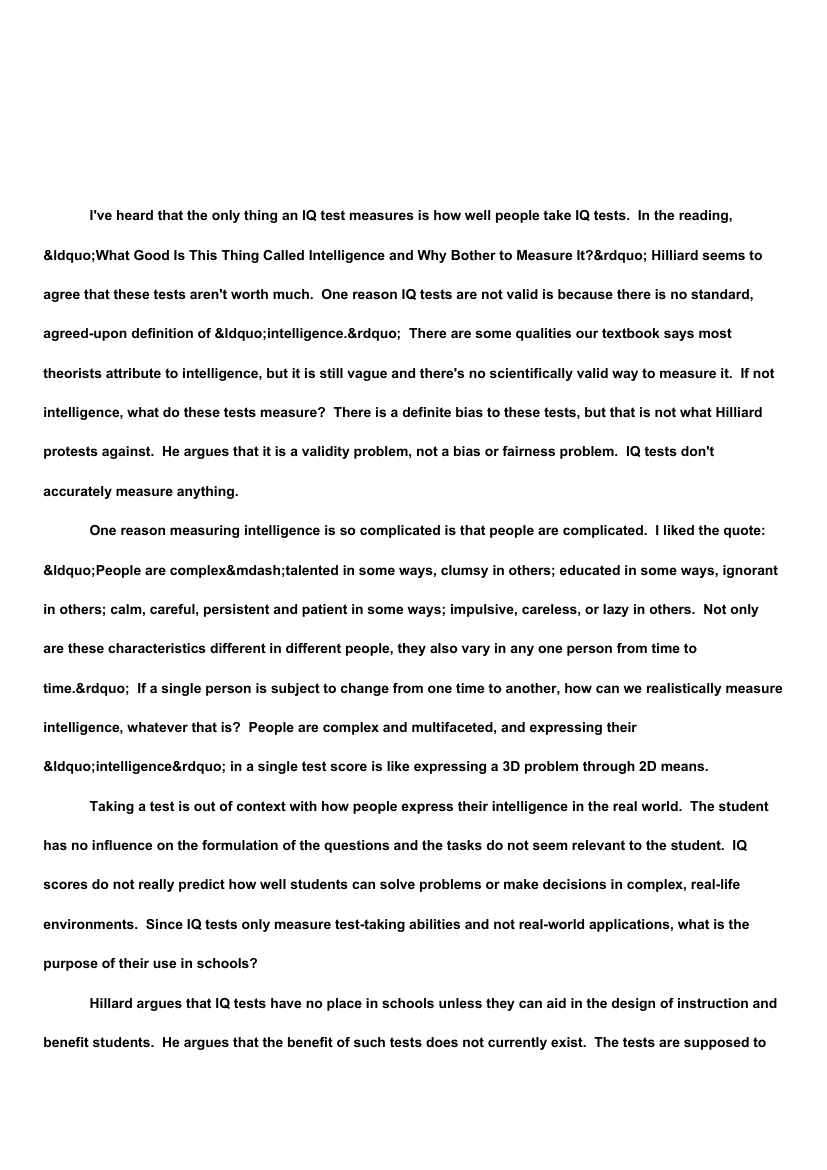“What Good Is This Thing Called Intelligence and Why Bother to Measure It?” Hilliard Response
Publié le 22/05/2020

Extrait du document
« I've heard that the only thing an IQ test measures is how well people take IQ tests. In the reading, “What Good Is This Thing Called Intelligence and Why Bother to Measure It?” Hilliard seems to agree that these tests aren't worth much. One reason IQ tests are not valid is because there is no standard, agreed-upon definition of “intelligence.” There are some qualities our textbook says most theorists attribute to intelligence, but it is still vague and there's no scientifically valid way to measure it. If not intelligence, what do these tests measure? There is a definite bias to these tests, but that is not what Hilliard protests against. He argues that it is a validity problem, not a bias or fairness problem. IQ tests don't accurately measure anything. One reason measuring intelligence is so complicated is that people are complicated. I liked the quote: “People are complex—talented in some ways, clumsy in others; educated in some ways, ignorant in others; calm, careful, persistent and patient in some ways; impulsive, careless, or lazy in others. Not only are these characteristics different in different people, they also vary in any one person from time to time.” If a single person is subject to change from one time to another, how can we realistically measure intelligence, whatever that is? People are complex and multifaceted, and expressing their “intelligence” in a single test score is like expressing a 3D problem through 2D means. Taking a test is out of context with how people express their intelligence in the real world. The student has no influence on the formulation of the questions and the tasks do not seem relevant to the student. IQ scores do not really predict how well students can solve problems or make decisions in complex, real-life environments. Since IQ tests only measure test-taking abilities and not real-world applications, what is the purpose of their use in schools? Hillard argues that IQ tests have no place in schools unless they can aid in the design of instruction and benefit students. He argues that the benefit of such tests does not currently exist. The tests are supposed to. »
↓↓↓ APERÇU DU DOCUMENT ↓↓↓
Liens utiles
- Mercredi des Cendres (extrait)Thomas Stearns EliotBecause I do not hope to turn againBecause I not hopeBecause I do not hope to turnDesiring this man's gift and that man's scopeI no longer strive to strive towards such things(Why should the aged eagle stretch its wings ?
- The 1960’s and the American Woman: the transition from the “housewife” to the feminist
- “GÉNERO NARRATIVO”
- What are the influences of the Gilead society and how they have an impact on the woman’s lives?
- Verlaine, Poèmes saturniens, “Mon rêve familier”, 1866 : Lecture analytique


